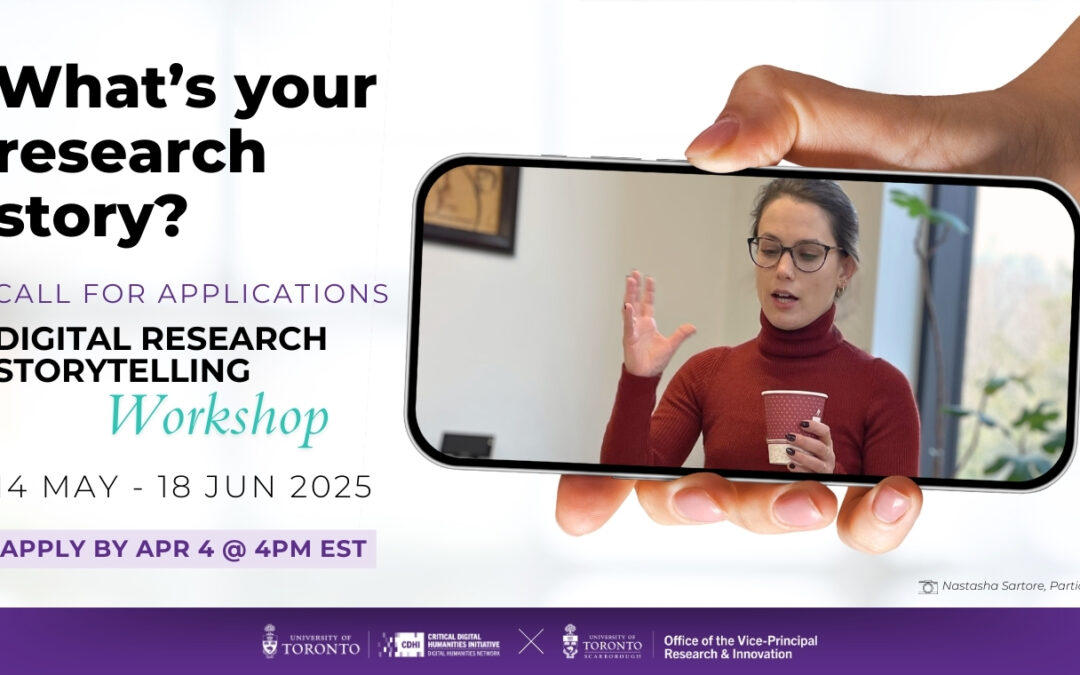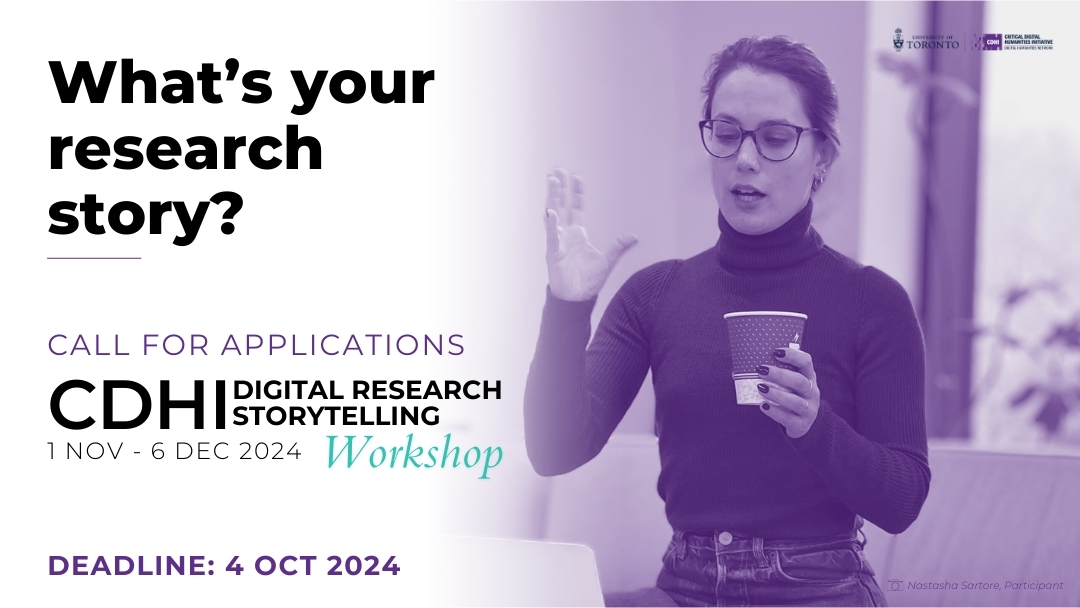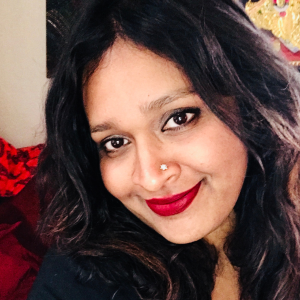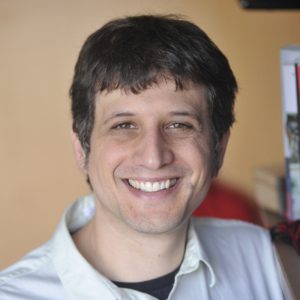Faculty
Faculty Opportunities
Tuition Support for DH@Guelph Summer Workshops
Deadline: Friday, April 25 at 4:00 pm EST Are you looking for more training in digital humanities tools and methods? CDHI is offering tuition support for graduate students, post-doctoral fellows, faculty, sessional instructors, and librarians to attend this training...

Call for Applications: Digital Research Storytelling Workshop, 14 May-18 Jun 2025
For more information on Digital Research Storytelling, please visit our Digital Research Storytelling Workshop page Applications are now open for our next six-week, in-person digital research storytelling workshop, running from May 14 to June 18, 2025, at the Sam...
Digital Humanities Summer Institute (DHSI) Tuition + Travel Support
The Digital Humanities Summer Institute (DHSI) is moving to Montreal for summer 2025. This year, DHSI will offer 33 courses over two weeks: Week One: 26-30 May 2025 Week Two: 02-06 June 2025 DHSI courses and lectures will take place at the Université de Montréal...

Call for Applications: Digital Research Storytelling Workshop, 1 Nov-6 Dec 2024
For more information on Digital Research Storytelling, please visit our Digital Research Storytelling Workshop page The Critical Digital Humanities Initiative (CDHI), a tri-campus research initiative funded by the University of Toronto’s Institutional Strategic...
Call for Applications: Critical DH Co-Working Space
CDHI is now accepting applications for Research Teams in Residence in the Critical DH Co-Working Space. As researchers make plans for returning to campus, the Critical Digital Humanities Initiative and Jackman Humanities Institute are pleased to welcome DH faculty...
Emerging Projects Fund
Note: CDHI’s Emerging Project Fund program is paused for 2024-25.
The Critical Digital Humanities Initiative’s Emerging Project Fund offers funding for time-limited, faculty-led digital humanities project planning, partnership networking, and/or tool-building through competitive seed grants. Each award of $10,000 is designed to support faculty research in critical digital humanities. The Emerging Projects Fund particularly seeks to build research projects and teams that will be well positioned to apply for Tri-Council or other funding in the future.
While all DH scholars are encouraged to apply, we will prioritize research projects engaged in critical digital humanities: research that emphasizes questions of power, social justice, and critical theory in making and analyzing digital technologies. We also encourage applications for critical digital humanities projects that foreground creative praxis, co-creation, public engagement, and community-based research.
Eligibility: All full-time faculty members at the University of Toronto, including research stream, teaching stream, and CLTAs. In the case of multi-university teams or community partnerships, the lead applicant must be a University of Toronto faculty member.
Funds Awarded: Applications will be considered for budgets up to $10,000.
Recipients
Congratulations to the five winning projects of the 2023–2024 Emerging Projects Fund competition of the Critical Digital Humanities Initiative! These exciting, cutting edge critical digital humanities projects, each of which has been awarded $10,000, represent the diversity of DH research at UofT.
-
- Seika Boye (Centre for Drama, Theatre and Performance Studies, FAS) leads the team project “Look at These Oral Histories!: Graphic Recording and Visual Data in Dance Research” which brings together two dance history projects. Having successfully completed the CDHI UX Accelerator program in Fall 2022 to improve the online user experience of graphic recordings of dance, she now aims to create new graphic recordings using oral history interviews from Black Canadian dance artists. By identifying data embedded in existing graphic recordings, the team will also explore future uses and representations of this data.
- Nadège Compaoré (Department of Political Science, FAS) leads a project called “Black Internationalism in Canada: Uncovering Traces, Spaces & Faces of the Gibbs Family.” The project focuses on Mifflin Wistar Gibbs, the first Black politician elected in British Columbia, and his daughter Ida Gibbs Hunt. By creating a digital collection of oral interviews and using archival analysis, the project explores the political motivations, structures, actors, and challenges faced by the Gibbs family in their contributions to Black internationalist efforts. The project also aims to create a publicly accessible digital collection, aided by UTL communications offices and social media promotion.
- Jon Johnson (Woodsworth College, FAS) and Jill Carter (Centre for Drama, Theatre and Performance Studies; Transitional Year Programme; and Indigenous Studies, FAS) lead the project “Developing a New First Story Toronto Website.” The project aims to create a website that hosts diverse digital content supporting the First Story Toronto initiative. Through this endeavour, the team intends to transform how Torontonians share stories about land and place by amplifying Indigenous voices, leadership, and stewardship. Utilizing digital initiatives and media, the project fosters ethical relationships with Indigenous peoples, land, and knowledge, facilitating an online process of ethical witnessing and encouraging reciprocal commitments with Indigenous communities.
- Shahrzad Mojab and Genevieve Ritchie from the Women & Gender Studies Institute, FAS, co-direct the project “Youth Voice: Building Civic and Digital Literacies with Refugee Youth.” They aim to analyze and transform the use of digital media by non-governmental organizations (NGOs) in building critical digital and civic literacies among refugee youth. The project addresses the low and unequal distribution of youth digital literacy, political literacy, and technology access. By collecting data on NGO engagement with refugee youth through social and digital media, creating a digital syllabus, and facilitating knowledge exchanges with scholars and NGOs, the project seeks to form new research partnerships with international groups.
- Alejandro Paz (Department of Anthropology, UTSC) leads the project “Towards a Decolonial Palestinian Archives: Curating the Tawfiq Canaan Collections of the Birzeit University Museum.” The project focuses on digitizing a selected group of items from the museum’s collection. Its goal is to enhance the significance of the Canaan collections at the Birzeit University Museum in Palestine (BZUM), which played a crucial role in its establishment in 2005. By establishing a partnership with the Hearing Palestine Initiative at the University of Toronto (HPI), employing decolonial methodologies, and fostering mutual collaboration, the project aims to provide a valuable resource for Palestinian intellectual history, science, medicine, anthropology, and folklore.
The CDHI has been funded by the University of Toronto’s Institutional Strategic Initiatives program. We are pleased to support these faculty-led projects as part of its mandate to position UofT as a global leader in bringing questions of power and inequality to digital humanities research.
To learn more about our funding opportunities for Emerging Projects, please visit Research Funding.
Past Recipients (2022–2023)
The five winners of the 2022–2023 Emerging Projects Fund competition of the Critical Digital Humanities Initiative were awarded $4,000.
-
-
Dr. Antia Gonzalez Ben (Faculty of Music) with Dr. Jess Mullen (Lecturer in Music Education Penn State) are leading “Pandemic Profits” which seeks to map the state, non-profit, and private actors involved in music education policy in Canada and the United States. They explore how the COVID-19 pandemic has intensified the “hidden privatization” of public music education. By focusing on relationships between public schools and proprietary digital music-making resources, they consider how equity discourses have been deployed to advance private interests
- Dr. TL Cowan (Faculty of Information and Department of Arts, Culture, and Media, UTSC) with Dr. Jas Rault (Faculty of Information and Department of Arts, Culture, and Media, UTSC) and in collaboration with the Trans-Feminist and Queer Digital Praxis Workshop (TFQ DPW) will digitize and exhibit select materials from the archive of Zab Design. This research-creation project explores the collaborative processes of Trans-Feminist and Queer graphic and typographical design practices and cultural interpret
- Dr. Jessica Mace (Department of Art History) and Dr. Joseph Clarke (Department of Art History) lead the Hidden Toronto project which showcases Toronto’s overlooked architecture in a series of interactive story-maps, using multimedia documentation (video, audio, images, and text) on an open-access web platform. In collaboration with the Toronto Society of Architects, initial storylines for this project will include the spaces of the labouring classes, women and architecture, and queer Toronto.
- Dr. Jed Meltzer (Baycrest Health Sciences, Departments of Psychology and Speech-language Pathology), Maureen Buchanan (Kingston Indigenous Languages Nest, Batchewana First Nation), Dr. Lindsay Morcom (Faculty of Education, Queen’s University, Ardoch Algonquin First Nation) and Dr. Juvenal Ndayiragije (Department of Language Studies, UTSC) are building an online course for learning the indigenous language Ojibwe using spaced repetition software, a method in which people drill digital flashcards for about 20-30 minutes a day, and a scheduling algorithm tracks performance to optimize the efficiency with which learners acquire words. The Ojibwe course will serve as a model that can be adapted into other languages.
- Dr. Ajay Rao (Historical Studies, UTM) is generating a database through manuscript digitization of texts which will greatly expand the range of texts available for the study of Sanskrit intellectual history. Students will produce diplomatic transcriptions of unpublished Sanskrit manuscripts that can be used as training data for OCR text recognition software. The textual study focuses on Sanskrit scholarship from roughly 1500 to 1900, an extensive corpus that includes some of the most sophisticated works of philosophy produced in the history of the world.
-
JHI-UTSC Early Career Digital Humanities Fellowship
The Jackman Humanities Institute, with the support of UT-Scarborough, the UTSC Library, the Dean of UTSC and the Office of the Vice-Principal Research, supports a 18-month Digital Scholarship project in 2021-2022. The JHI-UTSC DH early career faculty fellow leads a team involving undergraduate and graduate students and library staff to produce the following outcomes:
-
- participation in the Critical Digital Humanities Initiative
- curricular innovation
- advancement on a scholarly project
- a grant proposal (SSHRC, Early Researcher Award, or other)
Current Fellow
Aparna Nair

Aparna Nair is an historian and occasional anthropologist of disability, race, technology, medicine, and public health in South Asia, with emerging interests in animal studies/history and popular culture. Her work is fundamentally interdisciplinary, and driven by her interest in exploring the pasts, presents and possible futures of disability. Her research is also undeniably shaped by her own experiences of epilepsy, and part of her research involves hospital-based ethnographic explorations of epilepsy and its meanings for identity, belonging, family and community. In her teaching, she is committed to both the public and digital humanities, and to disability justice as an organizing principle.
Project Title: Everyday Technologies and the Experience of Disability in India, 1900–1990. Whether referring to prostheses or Braille presses or reading software, technology has routinely been pitched as a particularly important “panacea” to the “problem” of disability. Technology is seen as approximating normalcy in disabled populations; as facilitating anti-poverty efforts, increasing social participation, and improving access; in short, transforming disabled bodies into approximations of “normal.” But how have disabled people experienced technology in India? This interdisciplinary project will examine experience and identity through the lens of assistive technology in India in the 20th century and will be published in open access format.
Past Fellows
Sherry S. Yu

Digital Ethnic Media Hub (DEMH) aims to serve as a publicly accessible digital space for 1) an ethnic media directory and 2) an ethnic news database. It responds to the absence of consolidated up-to-date open access to Canadian ethnic media for research, teaching, professional practice, and public knowledge. This lack of equity and inclusion of long-established ethnic journalism in the Canadian media system creates an ever-widening gap in the public discourse, especially in the digital age, and poses great challenges to serve the information needs of the members of multicultural society. This project aims to develop a prototype of DEMH and an application for additional funding which will help further assess user experiences and sustainability of DEMH as a multi-cultural, multi-ethnic, and multilingual information hub.
Mark V. Campbell

AfroSonic Audio is a research creation project by which Dr. Campbell works at the intersections of Black studies, musicology and the digital humanities to produce two audio tracks utilizing archival materials from Toronto’s sonic lineage. In this project, Mark asks two main questions: (1) “How can the archiving of hip hop’s sonic innovations contribute creative and conceptual methodologies focused on decolonizing the archive?” “Since digital technologies allow for a greater visibility and appreciation of black cultural repertoire, can the creative process of performing embodied Black cultural knowledges remix notions of preservation?”
To answer these questions, his project is divided into three research and creative components.
- Digitization: Thirty radio shows from the longest running hip hop radio show in Canada—the Masterplan Show (CIUT 89.5fm)—and thirty analogue mixtapes from Toronto and the GTA will be digitized and annotated.
- Annotation & Ideation: After listening to all the audio, the project team will assign metadata attributes to the annotated archival audio, including capturing aspects of localism, vernacular and DJ techniques that speak specifically to the Toronto context. These annotations will be used as part of a course assignment and experiential DJ lab in Mark’s UTSC course.
- Writing & Creation: Two new audio tracks will integrate audio samples chosen from the archival materials, with feedback and collaboration from DJs on the Masterplan Radio Show. Other outputs include an annotated bibliography and a journal article.
Alejandro I. Paz

MediaCat: In his latest project, Alejandro considers the impact of Israeli English-language news websites on the digital dissemination of news about Israel and Palestine specifically, and about the Middle East more generally. He collaborates with others on an extensive digital component, in order to better track the digital dissemination of news online. The web-application they’ve been developing is called MediaCAT.
The last twenty years have seen decisive shifts in the production and consumption of news and information in the North Atlantic. This project explores new ways to visualize the intertextual knowledge that forms in this new media environment. In particular, he and his team will develop visualizations for a new digital tool, called MediaCAT, that creates a corpus to study the intertextual sourcing in contemporary journalism.
Alejandro’s project will link three existing research and pedagogical goals:
- Improve on how we conceptualize the digital dissemination of sources, and the visualizations of digital intertextuality, by developing and publicizing new kinds of visualizations as part of an existing Digital Humanities tool developed at the UTSC called MediaCAT.
- Enable analysis and publications based on a new corpus produced by MediaCAT on the impact of Israeli English journalism.
- Promote the use of MediaCAT and contribute to a working group dedicated to examining Digital Palestine/Israel.
